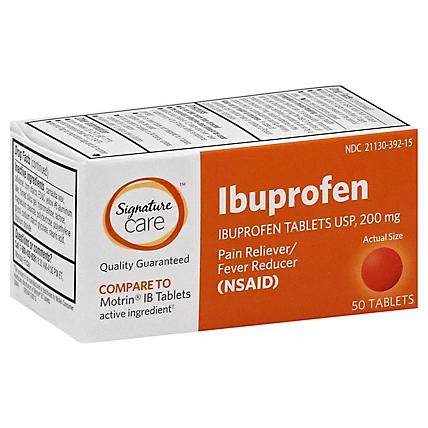Motrin is a popular over-the-counter medication used to relieve minor aches and pains. The active ingredient in Motrin is ibuprofen, which is also found in other pain relievers such as Advil and Nurofen. However, Motrin PM combines ibuprofen with diphenhydramine, an antihistamine that can cause drowsiness. This combination of pain relief and sleep aid makes Motrin PM a popular choice for thoe looking for a good night’s sleep.
But does Motrin really make you sleepy? The answer is yes, Motrin PM can cause drowsiness due to the presence of diphenhydramine. Diphenhydramine is an antihistamine that can cause sedation and is commonly used in sleep aids such as Benadryl. When combined with ibuprofen, diphenhydramine can help ease pain and promote sleep.
However, it is important to note that not everyone will experience drowsiness from taking Motrin PM. The effects of diphenhydramine can vary from person to person, and some individuals may not feel sleepy at all. It is also important to be aware of the potential side effects of both ibuprofen and diphenhydramine.
Ibuprofen can cause side effects such as stomach upset, nausea, and dizziness. It can also increase the risk of heart attack and stroke when taken in high doses or for prolonged periods of time. Diphenhydramine can cause side effects such as dry mouth, blurred vision, and constipation. It can also interact with other medications, so it is important to check with a doctor or pharmacist before taking Motrin PM.
Motrin PM can make you sleepy due to the presence of the antihistamine diphenhydramine. However, it is important to be aware of the potential side effects and interactions with other medications before taking this combination pain reliever and sleep aid. As always, it is recommended to consult with a healthcare professional before starting any new medication.
The Effects of Motrin on Sleep
Motrin can help you sleep. MOTRIN® PM is a medication that combines the active ingredient ibuprofen, which is a pain reliever, with diphenhydramine, which is an antihistamine that causes drowsiness. The diphenhydramine in MOTRIN® PM helps to induce sleepiness and promote a restful night’s sleep. However, it is important to note that this medication is intended for the temporary relief of minor aches and pains and is not recommended for long-term use as a sleep aid. Additionally, as with any medication, it is important to read and follow the label instructions and consult with a healthcare professional before use.

Source: amazon.com
The Effects of Tylenol and Motrin on Drowsiness
Tylenol, also known as acetaminophen, typically does not cause drowsiness as it is not a sedative medication. However, if it is combined with crtain other drugs, such as narcotics or alcohol, it may cause drowsiness as a side effect. Motrin, also known as ibuprofen, may cause drowsiness as a potential side effect, although it is not a common one. More commonly reported side effects of ibuprofen include gastrointestinal symptoms such as stomach pain or heartburn. It is important to always read and follow the label instructions and consult with a healthcare provider if you have any concerns about the effects of a medication.
Side Effects of Motrin
Motrin is a nonsteroidal anti-inflammatory drug (NSAID) that is commonly used to alleviate pain, inflammation, and fever. However, like all medications, Motrin can cause side effects in some individuals. The most common side effects of Motrin include abdominal pain, acid or sour stomach, belching, bloating, cloudy urine, decrease in urine output or decrease in urine-concentrating ability, and difficulty having a bowel movement (stool). In addition, some people may experience dizziness, headache, heartburn, nausea, and vomiting. Rare but serious side effects of Motrin include allergic reactions, bleeding, liver or kidney damage, and stroke or heart attack. It is important to inform your healthcare provider if you experience any of thee serious side effects. Motrin is generally well-tolerated, but it is important to be aware of the potential side effects and to use the medication as directed by your healthcare provider to minimize the risks.
The Effects of Ibuprofen on Sleep
Ibuprofen is a nonsteroidal anti-inflammatory drug (NSAID) that is commonly used to alleviate pain and reduce inflammation. It works by blocking the production of prostaglandins, which are chemicals in the body that cause pain and inflammation.
However, ibuprofen alone does not have any sedative properties. The reason why it may make you feel drowsy is because of the addition of diphenhydramine, an antihistamine that is often combined with pain relievers in over-the-counter sleep aids like ibuprofen PM.
Diphenhydramine is known to cause drowsiness and is often used as a sleep aid. When combined with ibuprofen, it can help to ease any aches or pains that may be keeping you awake while also inducing sleepiness.
It’s important to note that while ibuprofen PM may be effective in helping you fall asleep, it is not recommended for long-term use as it can lead to dependence and other side effects. It’s always best to consult with a healthcare professional befre taking any sleep aids or medications.
The Benefits of Taking Ibuprofen Before Bed
Ibuprofen, the active ingredient in Advil, is primarily used as a pain reliever and anti-inflammatory medication. While it is not specifically designed to help with sleep, Advil Nighttime, a specific formulation of ibuprofen, is marketed as a sleep aid. It contains both ibuprofen to relieve pain and diphenhydramine, an antihistamine that can cause drowsiness.
However, it is important to note that relying solely on medication to improve sleep may not be the most effective solution. Healthy sleep habits, or sleep hygiene, such as creating a consistent sleep schedule, minimizing screen time befoe bed, and creating a comfortable sleep environment, are also important factors in getting better, more restful sleep. Additionally, if you are experiencing ongoing sleep issues or pain that is interfering with your sleep, it is always best to consult with a healthcare professional for personalized advice and treatment options.

Source: theconversation.com
How Quickly Does Motrin Take Effect?
Motrin, also known as ibuprofen, is a non-steroidal anti-inflammatory drug (NSAID) that is commonly used to relieve pain and reduce fever. The time it takes for Motrin to start working can vary depending on the individual and the form of the medication. Generally, Motrin tablets, capsules, and liquid forms start working within 30 minutes to an hour after taking them. However, it may take longer for extended-release formulations to take effect. It is important to note that taking Motrin with food can help reduce some of the common side effects, such as heartburn or nausea. If you are experiencing severe pain or fever, it is recommended to consult with your healthcare provider for appropiate dosing and treatment.
Comparing the Strength of Motrin and Tylenol
Motrin (ibuprofen) is generally considered to be stronger than Tylenol (acetaminophen) for treating inflammatory pain conditions. Ibuprofen is a nonsteroidal anti-inflammatory drug (NSAID) that works by reducing inflammation, swelling, and fever. It is FDA-approved to treat conditions such as osteoarthritis and rheumatoid arthritis. Tylenol, on the othr hand, is an analgesic that works by blocking pain signals to the brain. While it can also reduce fever, it does not have anti-inflammatory properties.
However, it is important to note that the strength of a medication can vary depending on the individual and their specific condition. Additionally, both Motrin and Tylenol can cause side effects and interact with other medications, so it is important to speak with a healthcare provider before taking either medication. Motrin is considered to be stronger than Tylenol for treating inflammatory pain, but the best option will depend on the individual’s specific situation.
Difference Between Ibuprofen and Motrin
Ibuprofen and Motrin are actually the same medication, with the same active ingredient. Motrin is simply a brand name for the drug ibuprofen, just as Advil is anoher brand name. The difference between the two lies solely in their names and packaging. Both medications are classified as nonsteroidal anti-inflammatory drugs (NSAIDs) and work by reducing inflammation, pain, and fever. However, it is important to note that while ibuprofen and Motrin are generally safe when taken as directed, they can have side effects such as stomach upset or bleeding, and should only be used under the guidance of a healthcare provider.
Comparing the Effectiveness of Motrin and Tylenol
It’s important to note that both Motrin (ibuprofen) and Tylenol (acetaminophen) are effective pain relievers and fever reducers, but they work in different ways. Ibuprofen is a nonsteroidal anti-inflammatory drug (NSAID) that not only reduces pain and fever but also helps to reduce inflammation. Acetaminophen, on the other hand, only reduces pain and fever but does not have anti-inflammatory properties.
Whether Motrin is worse than Tylenol depends on the individual’s medical history, current health status, and the reason for taking the medication. For example, individuals with a history of stomach ulcers or bleeding disorders may be advised to avoid NSAIDs like Motrin. Similarly, thse with liver disease or alcoholism may be cautioned against taking high doses of acetaminophen.
It’s always recommended to consult with a healthcare provider before taking any medication to ensure that it’s safe and appropriate for your specific circumstances. In general, both Motrin and Tylenol are effective pain relievers when used as directed and in appropriate doses.

Source: bjs.com
What Should Not Be Combined With Motrin?
Motrin, also known as ibuprofen, is a nonsteroidal anti-inflammatory drug (NSAID) used to relieve pain, reduce fever, and decrease inflammation. Some substances should not be mixed with Motrin due to the risk of negative interactions and side effects.
Firstly, you should not mix Motrin with other NSAIDs, such as aspirin, naproxen, or celecoxib, as this can increase the risk of stomach bleeding and other adverse effects.
Secondly, daily use of alcohol and tobacco, especially when combined with Motrin, may increase your risk of stomach bleeding. It is recommended to avoid consuming alcohol or tobacco while taking Motrin to reduce this risk.
Thirdly, you should not take Motrin with certain medications, such as blood thinners (e.g., warfarin), corticosteroids (e.g., prednisone), and selective serotonin reuptake inhibitors (SSRIs) used to treat depression and anxiety, as this can increase the risk of bleeding and other side effects.
It is also important to inform your healthcare provider of any other medications, supplements, or herbal products you are taking befoe starting Motrin to ensure safe and effective use.
Comparing the Strength of Motrin and Advil
Motrin and Advil both contain the same active ingredient, ibuprofen, which is a non-steroidal anti-inflammatory drug (NSAID) used to relieve pain, fever, and inflammation. Therefore, there is no difference in strength between the two drugs. The only difference between the two is their brand name and packaging. It is worth noting that while ibuprofen is generally a safe and effective medication, it can have side effects, especially when tken in high doses or over a long period of time. It is important to follow the instructions on the label and to consult with a healthcare professional if you have any questions or concerns about taking ibuprofen.
The Effects of Motrin on Children’s Sleep Patterns
Motrin is a brand name for ibuprofen, which is a nonsteroidal anti-inflammatory drug (NSAID) used to relieve pain and reduce fever. While drowsiness is not a common side effect of ibuprofen, it can occur in some children. The medication may cause dizziness or drowsiness in children who are sensitive to its effects or who take higher than recommended doses. Therefore, it is important to follow the dosage instructions provided by the healthcare provider or on the medication label. If a child experiences any unusual symptoms whie taking Motrin, such as excessive sleepiness, it is recommended to seek medical attention immediately.
The Benefits and Risks of Taking Ibuprofen Before Bed
Taking ibuprofen bfore bed can help relieve pain and inflammation that may be keeping you awake. However, it is important to follow the recommended dosage and not exceed the maximum daily dose. It is also important to note that ibuprofen may not be suitable for everyone, especially those with certain medical conditions or who are taking other medications. It is always best to consult with a healthcare professional before taking any medication, including ibuprofen, before bed. Additionally, while this particular study found that ibuprofen did not interfere with sleep, other studies have shown that taking non-steroidal anti-inflammatory drugs (NSAIDs) before bed can sometimes lead to sleep disturbances. Therefore, it is important to weigh the potential benefits and risks before deciding to take ibuprofen before bed.

Source: albertsons.com
The Effects of Lying Down After Taking Ibuprofen
It is generally not recommended to lie down immediately after taking ibuprofen or any medication. This is because lying down can slow down the movement of the medication through the esophagus and into the stomach, which can increase the risk of irritation or damage to the esophagus.
It is recommended to remain in an upright position for at least 10-15 minutes after taking ibuprofen, to alow the medication to pass through the esophagus and into the stomach. This can help to minimize the risk of irritation or damage to the esophagus, and ensure that the medication is properly absorbed into the bloodstream.
If you experience any discomfort or pain while swallowing or feel that the medication is sticking in your throat, it is important to notify your healthcare provider immediately. They can provide further guidance on how to take the medication safely and effectively, and may recommend alternative treatments if necessary.
Conclusion
MOTRIN® PM is an effective medication that combines two powerful ingredients to povide relief from minor aches and pains while also promoting a restful night’s sleep. The active ingredients, acetaminophen and ibuprofen, work together to alleviate pain, while diphenhydramine, a sedating antihistamine, helps to induce sleep. However, it is important to note that long-term use of acetaminophen should be avoided unless directed by a physician, and ibuprofen may cause side effects such as abdominal pain, diarrhea, and heartburn. MOTRIN® PM can be a helpful option for those seeking relief from pain and difficulty sleeping, but it is important to always follow dosage instructions and consult with a healthcare professional if you have any concerns or questions.
